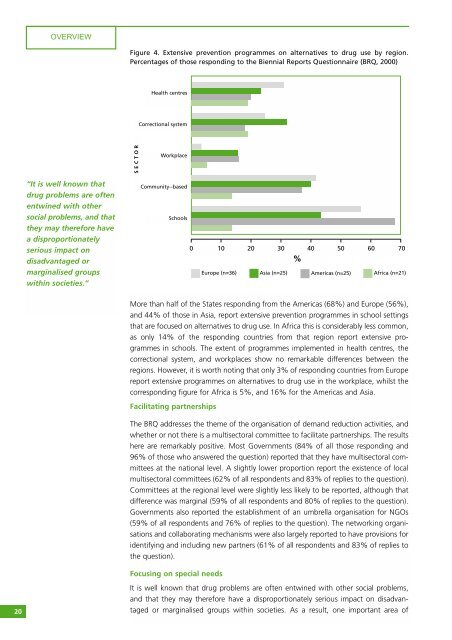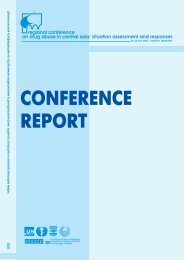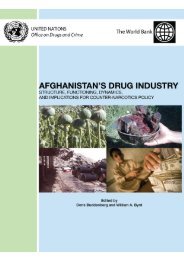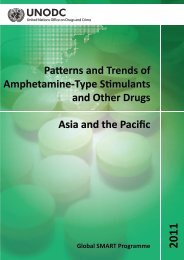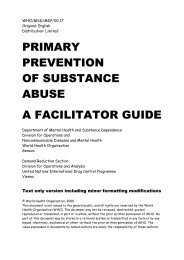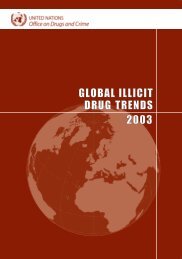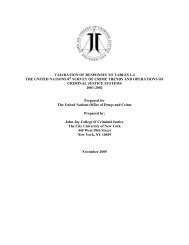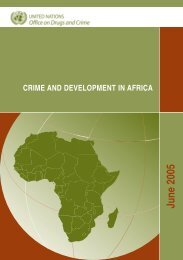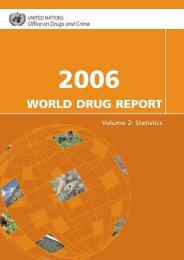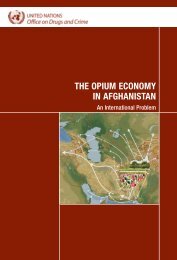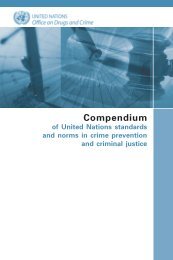PDF (Lessons learned in drug abuse prevention: a global review)
PDF (Lessons learned in drug abuse prevention: a global review)
PDF (Lessons learned in drug abuse prevention: a global review)
Create successful ePaper yourself
Turn your PDF publications into a flip-book with our unique Google optimized e-Paper software.
OVERVIEW<br />
Figure 4. Extensive <strong>prevention</strong> programmes on alternatives to <strong>drug</strong> use by region.<br />
Percentages of those respond<strong>in</strong>g to the Biennial Reports Questionnaire (BRQ, 2000)<br />
Health centres<br />
Correctional system<br />
SECTOR<br />
Workplace<br />
“It is well known that<br />
<strong>drug</strong> problems are often<br />
entw<strong>in</strong>ed with other<br />
social problems, and that<br />
they may therefore have<br />
a disproportionately<br />
serious impact on<br />
disadvantaged or<br />
marg<strong>in</strong>alised groups<br />
with<strong>in</strong> societies.”<br />
Community--based<br />
Schools<br />
0 10 20 30 40 50 60 70<br />
%<br />
Europe (n=36) Asia (n=25) Americas (n=25) Africa (n=21)<br />
More than half of the States respond<strong>in</strong>g from the Americas (68%) and Europe (56%),<br />
and 44% of those <strong>in</strong> Asia, report extensive <strong>prevention</strong> programmes <strong>in</strong> school sett<strong>in</strong>gs<br />
that are focused on alternatives to <strong>drug</strong> use. In Africa this is considerably less common,<br />
as only 14% of the respond<strong>in</strong>g countries from that region report extensive programmes<br />
<strong>in</strong> schools. The extent of programmes implemented <strong>in</strong> health centres, the<br />
correctional system, and workplaces show no remarkable differences between the<br />
regions. However, it is worth not<strong>in</strong>g that only 3% of respond<strong>in</strong>g countries from Europe<br />
report extensive programmes on alternatives to <strong>drug</strong> use <strong>in</strong> the workplace, whilst the<br />
correspond<strong>in</strong>g figure for Africa is 5%, and 16% for the Americas and Asia.<br />
Facilitat<strong>in</strong>g partnerships<br />
The BRQ addresses the theme of the organisation of demand reduction activities, and<br />
whether or not there is a multisectoral committee to facilitate partnerships. The results<br />
here are remarkably positive. Most Governments (84% of all those respond<strong>in</strong>g and<br />
96% of those who answered the question) reported that they have multisectoral committees<br />
at the national level. A slightly lower proportion report the existence of local<br />
multisectoral committees (62% of all respondents and 83% of replies to the question).<br />
Committees at the regional level were slightly less likely to be reported, although that<br />
difference was marg<strong>in</strong>al (59% of all respondents and 80% of replies to the question).<br />
Governments also reported the establishment of an umbrella organisation for NGOs<br />
(59% of all respondents and 76% of replies to the question). The network<strong>in</strong>g organisations<br />
and collaborat<strong>in</strong>g mechanisms were also largely reported to have provisions for<br />
identify<strong>in</strong>g and <strong>in</strong>clud<strong>in</strong>g new partners (61% of all respondents and 83% of replies to<br />
the question).<br />
Focus<strong>in</strong>g on special needs<br />
20<br />
It is well known that <strong>drug</strong> problems are often entw<strong>in</strong>ed with other social problems,<br />
and that they may therefore have a disproportionately serious impact on disadvantaged<br />
or marg<strong>in</strong>alised groups with<strong>in</strong> societies. As a result, one important area of


